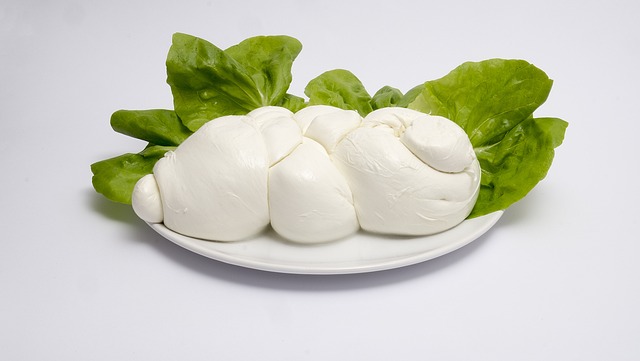Understanding the shelf life of mozzarella cheese is essential for ensuring its freshness and quality. So, how long is fresh mozzarella good for?
Fresh mozzarella can last several weeks unopened and 3-5 days once opened if properly stored at temperatures below 40°F (4°C). The shelf life of other varieties of mozzarella depends upon factors like temperature, packaging, and moisture content. Low-moisture mozzarella can last up to a few weeks after it’s opened.
We’ll explore the best ways to store them at home and provide tips on telling if your favorite cheesy snack has reached its end.
Table of Contents
Mozzarella Shelf Life: Unopened and Opened
Unopened Mozzarella Can Last Up To One Month if Stored Properly
Mozzarella cheese can last up to one month if stored properly. The key here is to keep it in its original packaging, which is designed to maintain its freshness. Ensure the package is sealed tightly and check the expiration date before purchasing.
To maximize the shelf life of unopened mozzarella, store it in the coldest part of your refrigerator, such as the meat drawer or the back of the bottom shelf. These areas tend to have a more consistent temperature, which helps preserve the cheese’s quality.
Opened Fresh Mozzarella Should Be Used in 3-5 Days for Best Quality
Once you open that fresh mozzarella package, consuming it within 3-5 days is best for optimal flavor and texture. Unlike processed cheeses loaded with preservatives, fresh mozzarella has a shorter shelf life due to its natural ingredients and lack of additives.

The texture and flavor of opened mozzarella deteriorate quickly once exposed to air. It becomes less soft and may even become rubbery over time. So, if you’re planning on making delicious caprese salads or gooey paninis with leftover mozzarella from yesterday’s dinner party, make sure you use them up within those 3-5 days for the best culinary experience.
The Texture and Flavor of Opened Mozzarella Deteriorates Quickly Once Exposed to Air
Exposure to air is mozzarella’s worst enemy. As soon as you remove that slice or ball of mozzarella cheese from its packaging, it starts to lose its freshness and quality. The moisture in the cheese begins to evaporate, resulting in a drier texture and less creamy mouthfeel.
To slow down this process, you can wrap the opened mozzarella tightly in plastic wrap or place it in an airtight container. This helps create a barrier between the cheese and the air, preserving its moisture and flavor for a little longer. However, keep in mind that even with proper storage, opened mozzarella will eventually lose its lusciousness, so it’s best to use it up as soon as possible.
Shelf Life of Mozzarella Cheese Varieties
From fresh mozzarella to shredded and aged options, each type has its own unique characteristics that affect how long it can last.

Moisture Content of Fresh Mozzarella Shortens Shelf Life
Fresh mozzarella, with its soft and delicate texture, has a relatively short shelf life compared to other types of mozzarella. This is primarily due to its high moisture content. The moisture in the cheese makes it more susceptible to bacterial growth and spoilage. Unopened fresh mozzarella typically lasts up to two weeks in the refrigerator.
However, once you open a package of fresh mozzarella, it’s best to consume it within a few days for optimal taste and quality. The exposure to air accelerates moisture loss and increases the chances of mold formation.
Extended Shelf Life of Shredded Mozzarella Due to Preservation
Due to additional preservation methods, shredded mozzarella cheese offers a longer shelf life than fresh mozzarella cheese. Manufacturers often add anti-caking agents or cellulose powder to shredded cheese, which helps prevent clumping and extends its freshness.

Unopened packages of shredded mozzarella can last for several weeks in the refrigerator. Once opened, tightly reseal the bag or transfer the cheese into an airtight container to maintain its freshness. Proper storage practices are crucial in preserving shredded mozzarella’s flavor and texture.
Prolonged Freshness of Smoked and Aged Mozzarella
Smoked and aged varieties of mozzarella have a significantly longer shelf life than their fresh counterparts. Smoking or aging processes help remove moisture from the cheese, making it less prone to spoilage.
Smoked mozzarella typically lasts about three weeks when unopened but should be consumed within one week after opening for optimal taste. Aged or “loaf” mozzarella can last up to six months if properly stored. Its firm texture and lower moisture content contribute to its extended shelf life.
Comparing the Shelf Life of Other Mozzarella Varieties
When comparing different mozzarella varieties, it’s important to note that buffalo mozzarella, made from buffalo milk, has a shorter shelf life than cow’s milk-based varieties. The higher fat content in buffalo mozzarella makes it more prone to spoilage.

Mozzarella balls or “bocconcini” have a similar shelf life to fresh mozzarella due to their high moisture content. It is best to consume them within a few days after opening for the best taste and quality.
| Mozzarella Variety | Unique Characteristics | Shelf Life (Unopened) | Shelf Life (Opened) |
| Fresh Mozzarella | Soft, creamy texture | 2-3 weeks | 3-5 days |
| Low-Moisture Mozzarella | Firmer texture, grates well | 6-8 weeks | 2-3 weeks |
| Shredded Mozzarella | Finely grated texture | 6-10 weeks | 2-3 weeks |
| Buffalo Mozzarella | Made from buffalo milk | 1-2 weeks | 1-3 days |
| Burrata | Cream-filled, delicate | 1-2 weeks | Best consumed fresh |
| Smoked Mozzarella | Infused with smoky flavor | 3-6 months | 2-4 weeks |
| Part-Skim Mozzarella | Lower fat content, mild flavor | 2-3 months | 2-3 weeks |
| String Cheese | Individual stringy portions | 2-3 months | 2-3 weeks |
| Ciliegine (Cherry-sized balls) | Small, bite-sized balls | 1-2 weeks | 2-5 days |
| Ovoline Mozzarella | Egg-sized, ideal for snacking | 1-2 weeks | 2-5 days |
| Bocconcini | Small, pearl-sized pieces | 1-2 weeks | 2-5 days |
Real Buffalo Mozzarella Has Shorter Shelf Life Than Cow’s Milk Varieties
Real buffalo mozzarella, imported from Italy and made with 100% buffalo milk, has a shorter shelf life than cow’s milk-based varieties. The authentic buffalo mozzarella typically lasts about one week when unopened and should be consumed within three days after opening.

It should be noted that most fresh mozzarella cheese bought in grocery stores is not “real” buffalo mozzarella cheese.
On the other hand, cow’s milk-based mozzarella can last up to two weeks when unopened and retains its freshness for about one week after opening if properly stored.
The Science Behind Mozzarella Going Bad
Understanding the science behind the spoilage process is important to know how to help prevent it from happening too quickly. Microbial activity, moisture content, and oxygen exposure are all factors that contribute to mozzarella cheese spoilage.

The Role of Microbial Activity in Mozzarella Spoilage
One key factor that contributes to mozzarella spoilage is microbial activity. Microorganisms such as bacteria, mold, and yeast play a significant role in breaking down the cheese and causing it to go bad.
Lactic acid bacteria are commonly found in mozzarella and are responsible for fermentation. These bacteria convert lactose into lactic acid, giving the cheese a tangy flavor. However, if left unchecked, these bacteria can multiply rapidly and lead to spoilage.
Mold and yeast are another set of microorganisms that can cause mozzarella to spoil. They thrive in moist environments and can grow on the surface of the cheese, resulting in discoloration and an off-putting taste. While some molds are harmless or desirable (such as those used in blue cheeses), others can harm the quality of mozzarella.

High Moisture in Mozzarella Makes It Go Bad Faster
Moisture content plays a significant role in determining how long mozzarella will last before spoiling. Mozzarella has a relatively high moisture content compared to other cheese types, making it more susceptible to bacterial growth and mold formation.
The moisture present in mozzarella creates an ideal environment for microorganisms to thrive. As a result, if not properly stored or consumed within a reasonable time frame, mozzarella can quickly become slimy or develop an unpleasant odor due to bacterial contamination.
To extend the shelf life of mozzarella, it is essential to store it properly by keeping it refrigerated at temperatures below 40°F (4°C). Wrapping the cheese tightly with plastic wrap or placing it in an airtight container can help reduce moisture loss and prevent exposure to external contaminants.
Airtight Packaging Reduces Oxygen Exposure
Oxygen exposure is another factor that can accelerate the spoilage of mozzarella. When mozzarella comes into contact with oxygen, it undergoes oxidation, which can lead to changes in flavor and texture.
Airtight packaging plays a crucial role in reducing oxygen exposure and prolonging the shelf life of mozzarella. Vacuum-sealed packages or tightly sealed containers create a barrier that prevents air from reaching the cheese, preserving its freshness for longer.
In contrast, if mozzarella is left exposed to air for an extended period, it may develop a sour taste and lose its characteristic milky flavor. The cheese may also become dry and crumbly, making consuming less enjoyable.

Storage Tips to Extend Mozzarella Shelf Life
Store Mozzarella in Original Packaging or Wrap Tightly in Plastic Wrap
To ensure that your mozzarella stays fresh and lasts as long as possible, it’s important to store it properly. If you’ve bought mozzarella in its original packaging, such as a vacuum-sealed bag or a container filled with brine (a saltwater solution), it’s best to leave it in that packaging. The manufacturers have designed it to keep the mozzarella fresh for an extended period.
If your mozzarella doesn’t come in its original packaging, don’t worry! You can still store it effectively by tightly wrapping it in plastic wrap. This helps to prevent air exposure and maintain its moisture content, keeping the cheese from drying out too quickly.
Refrigerate Mozzarella Below 40°F (4°C) to Slow Down Spoilage
Mozzarella is a delicate cheese with a high moisture content, which makes it susceptible to spoilage if not stored correctly. To slow down spoilage and extend its shelf life, always refrigerate your mozzarella at temperatures below 40°F (4°C). The cool temperature helps inhibit bacterial growth and keeps the cheese fresh for longer.

Remember to place your mozzarella on one of the colder shelves of your refrigerator rather than on the door. The door tends to experience more temperature fluctuations when opened frequently, which can affect the cheese quality.
Avoid Storing Mozzarella Near Strong Smelling Food to Prevent Odor Absorption
Mozzarella has a mild flavor and aroma that can easily absorb odors from other strong-smelling foods nearby. To prevent this, store your mozzarella away from pungent ingredients like onions, garlic, or strong cheeses. This will help preserve its delicate taste and prevent any unwanted flavors from seeping into the cheese.
If possible, consider using a separate container or section of your refrigerator specifically for storing mozzarella. This will further minimize the risk of odor absorption and help maintain its freshness.
Impact of Freezing on Mozzarella Texture and Quality
While it’s possible to freeze mozzarella to prolong its shelf life, it’s important to note that freezing can have an impact on its texture and quality. When frozen, mozzarella undergoes changes in its structure, resulting in a slightly grainier texture compared to fresh mozzarella.
However, freezing can be a convenient option if you plan to use frozen mozzarella for cooked dishes like pizzas or casseroles where the texture is less noticeable. Just make sure to wrap the cheese tightly in plastic wrap or place it in an airtight container before freezing to prevent freezer burn.

Remember that once thawed, frozen mozzarella should be used within a few days and not refrozen. Thawing it slowly in the refrigerator is recommended for best results.
By following these storage tips, you can extend the shelf life of your mozzarella and ensure that it remains fresh and delicious for as long as possible. Whether you’re using shredded mozzarella for sandwiches or enjoying fresh slices with tomatoes and basil, proper storage will help maintain its quality.
How Do You Know if Mozzarella Has Gone Bad?
But how can you tell if your mozzarella has gone bad? Here are some signs to look out for:
- Mold Growth: One of the most obvious signs that your mozzarella has spoiled is the presence of mold. If you spot any green or fuzzy growth on the surface of your cheese, it’s time to toss it out. Mold can spread quickly and may indicate that harmful bacteria are present.
- Off Smell: A strong, unpleasant odor is another telltale sign of spoiled mozzarella. If your cheese emits an off smell that is different from its usual mild aroma, it’s likely past its prime. Trust your nose on this one – a foul or sour scent clearly indicates something isn’t right.
- Slimy Texture: Fresh mozzarella should have a soft and slightly elastic texture. However, mozzarella becomes slimy and develops a mushy consistency when it goes bad. If your cheese feels slimy or sticky to the touch, it’s best to discard it.
- Discoloration: Healthy mozzarella should have a creamy white color throughout. Any discoloration, such as yellowing or browning spots, could be a sign of spoilage. Discolored areas may indicate bacterial growth or oxidation and should be avoided.

Discard Mozzarella If It Develops a Sour or Rancid Taste
While taste alone isn’t always a foolproof method for detecting spoilage in mozzarella, an unusual sour or rancid flavor can indicate spoilage. If your cheese tastes off or unpleasant, it’s best not to take any chances and dispose of it.
Changes in Moisture Level May Indicate Spoilage
If you notice that your mozzarella has become excessively dry or overly wet, it could be a sign of spoilage. Dryness may indicate that the cheese has lost its moisture and freshness, while excessive wetness can be a result of bacterial growth. Trust your instincts and avoid consuming mozzarella with abnormal moisture levels.
Trust Your Senses When It Comes to Mozzarella Spoilage
Your eyes, nose, touch, and taste buds are powerful tools for gauging the freshness of mozzarella. If you observe mold growth, detect an off smell or slimy texture, notice discoloration, or experience a sour or rancid taste, it’s best to err on the side of caution and discard the cheese.
Remember that proper storage techniques can help prolong the shelf life of mozzarella and reduce the risk of spoilage. However, if any doubt remains about the quality or safety of your cheese, it’s always better to be safe than sorry.

Frequently Asked Questions
Can I freeze fresh mozzarella?
You can freeze fresh mozzarella! However, keep in mind that freezing may alter its texture slightly. It’s best to slice or shred the fresh mozzarella before freezing it for easier use later on.
How long does shredded mozzarella last in the fridge?
Shredded mozzarella can last between 2-4 weeks in the refrigerator once opened, as it’s generally undergone preservation methods to extend its shelf-life. Be sure to store it in an airtight container or resealable bag to maintain its freshness.
Does smoked mozzarella last longer than regular mozzarella?
Smoked mozzarella tends to have a longer shelf life than regular mozzarella due to the smoking process. However, it’s still important to follow proper storage guidelines and use your senses to determine if it has gone bad.
Can I eat mozzarella after the expiration date?
While consuming mozzarella before its expiration date is generally recommended, you can still consume it a few days past that date if it appears and smells fine. Trust your senses, but exercise caution.
Is mold on mozzarella safe to eat?
If you spot mold on your mozzarella, it’s best to discard the entire piece of cheese. Mold can spread quickly and may not be limited to just the visible spots. It’s better to be safe than sorry when dealing with moldy cheese.

